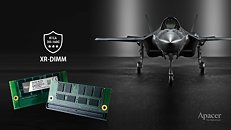- Joined
- Oct 9, 2007
- Messages
- 47,670 (7.43/day)
- Location
- Dublin, Ireland
| System Name | RBMK-1000 |
|---|---|
| Processor | AMD Ryzen 7 5700G |
| Motherboard | Gigabyte B550 AORUS Elite V2 |
| Cooling | DeepCool Gammax L240 V2 |
| Memory | 2x 16GB DDR4-3200 |
| Video Card(s) | Galax RTX 4070 Ti EX |
| Storage | Samsung 990 1TB |
| Display(s) | BenQ 1440p 60 Hz 27-inch |
| Case | Corsair Carbide 100R |
| Audio Device(s) | ASUS SupremeFX S1220A |
| Power Supply | Cooler Master MWE Gold 650W |
| Mouse | ASUS ROG Strix Impact |
| Keyboard | Gamdias Hermes E2 |
| Software | Windows 11 Pro |
Apacer, the leading manufacturer of industrial-grade memory, announces the release of the XR-DIMM. This rugged memory module is the first on the market to meet the exacting standards of the US RTCA DO-160G test, an aviation equipment certification that marks the XR-DIMM as resistant to high levels of vibration and therefore ideal for defense and aeronautical applications.
Since 2018, Apacer has been manufacturing DDR4 XR-DIMM modules with rugged stability in mind. Though previous models have been compliant with MIL-STD-810G, this new module is the first to be proven compliant with the US RTCA DO-160G standard, making it the ideal choice for manufacturers who need reliable operation through extreme vibration and shock.

Many defense, rail transit and in-vehicle systems worldwide still rely on standard memory modules. However, forward-looking manufacturers know Apacer's XR-DIMM modules offer significant improvements on reliability, with additions including 300-pin connectors and mounting holes to keep components in place. This allows the XR-DIMM to remain steady even when vehicles encounter uneven roads, powerful winds, or violent waves and to deliver stable performance.
As a well-established manufacturer in Taiwan, Apacer benefits from access to a booming aviation industry. According to Taiwan's Ministry of Economic Affairs, the total output value of Taiwan's aviation industry grew 11% in 2018 to almost US$4 billion. The 2019 Taipei International Aerospace and Defense Industry Exhibition also reported a record number of exhibitors and booths this year. Aerospace and defense manufacturers from Taiwan and from the rest of the world look to Apacer to create cutting-edge DRAM modules and SSDs. The XR-DIMM module with RTCA DO-160G certification is just the latest in a long line of Apacer innovations in this field. For more information, visit this page.
View at TechPowerUp Main Site
Since 2018, Apacer has been manufacturing DDR4 XR-DIMM modules with rugged stability in mind. Though previous models have been compliant with MIL-STD-810G, this new module is the first to be proven compliant with the US RTCA DO-160G standard, making it the ideal choice for manufacturers who need reliable operation through extreme vibration and shock.

Many defense, rail transit and in-vehicle systems worldwide still rely on standard memory modules. However, forward-looking manufacturers know Apacer's XR-DIMM modules offer significant improvements on reliability, with additions including 300-pin connectors and mounting holes to keep components in place. This allows the XR-DIMM to remain steady even when vehicles encounter uneven roads, powerful winds, or violent waves and to deliver stable performance.
As a well-established manufacturer in Taiwan, Apacer benefits from access to a booming aviation industry. According to Taiwan's Ministry of Economic Affairs, the total output value of Taiwan's aviation industry grew 11% in 2018 to almost US$4 billion. The 2019 Taipei International Aerospace and Defense Industry Exhibition also reported a record number of exhibitors and booths this year. Aerospace and defense manufacturers from Taiwan and from the rest of the world look to Apacer to create cutting-edge DRAM modules and SSDs. The XR-DIMM module with RTCA DO-160G certification is just the latest in a long line of Apacer innovations in this field. For more information, visit this page.
View at TechPowerUp Main Site



